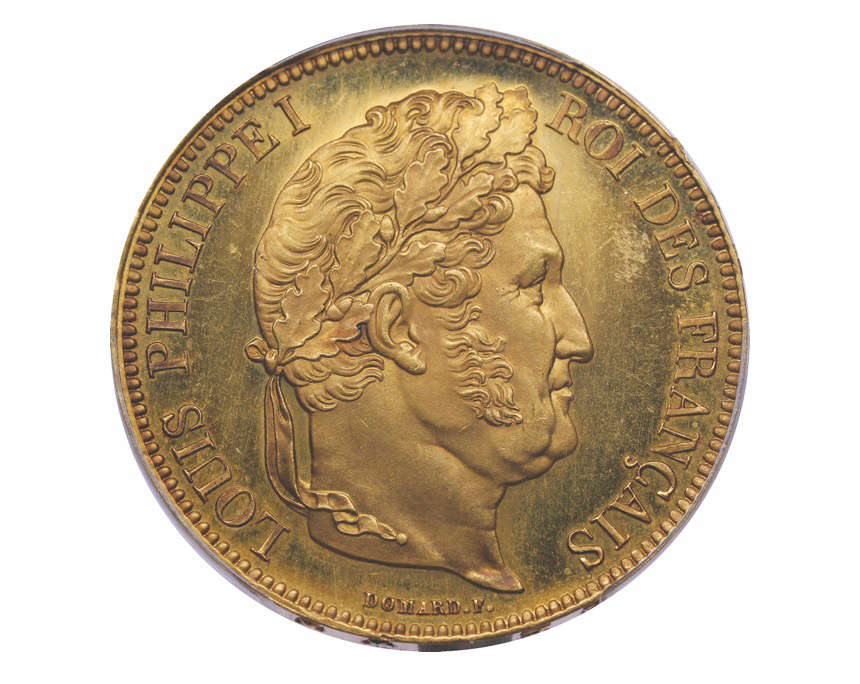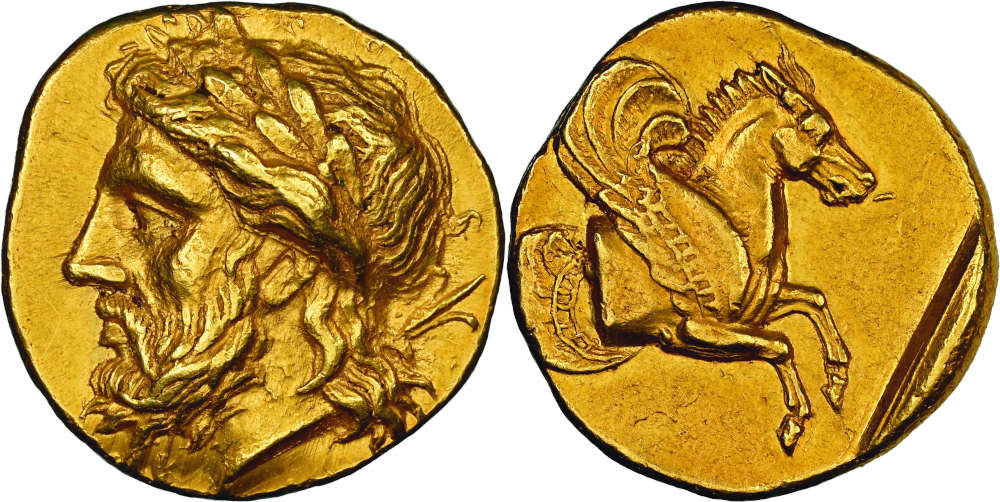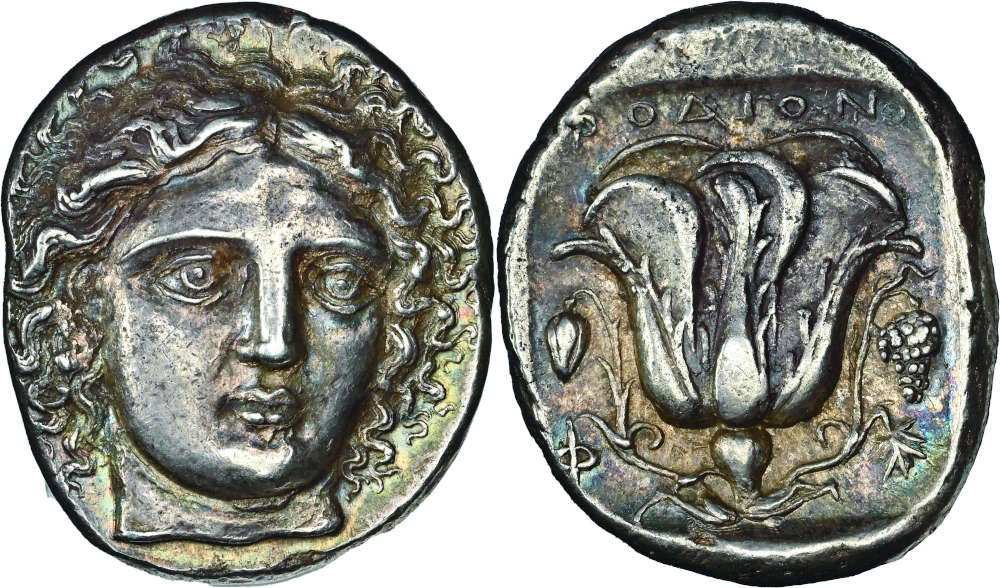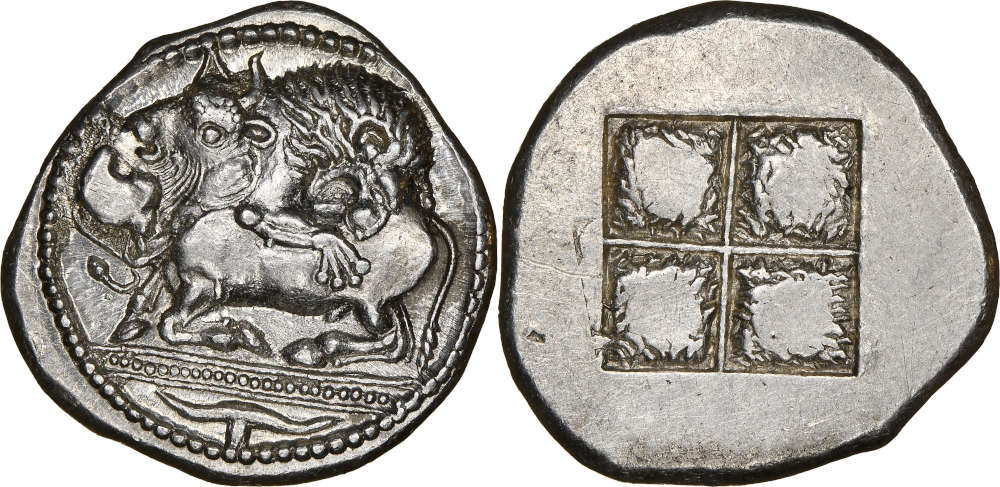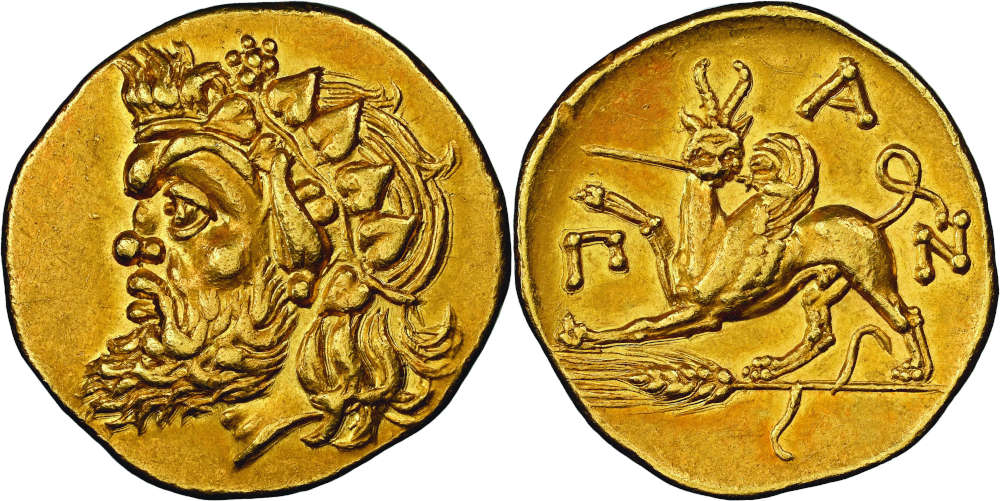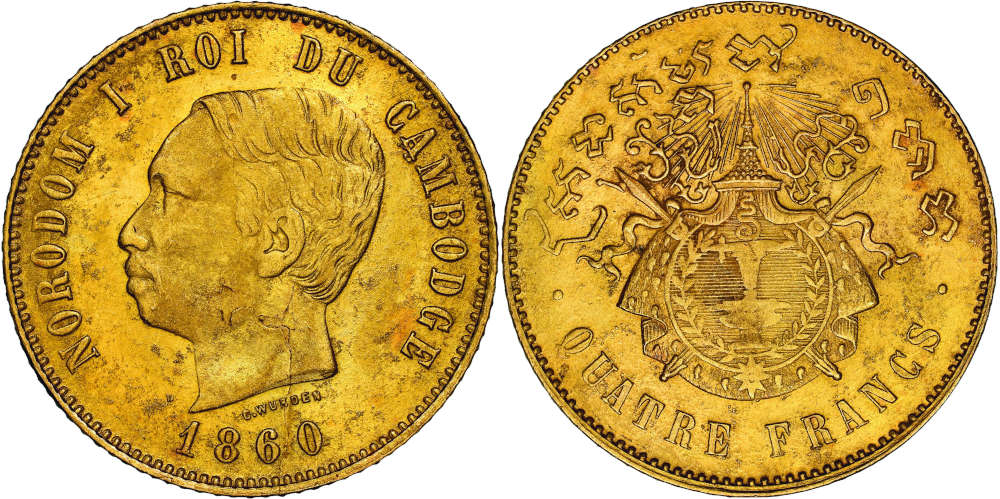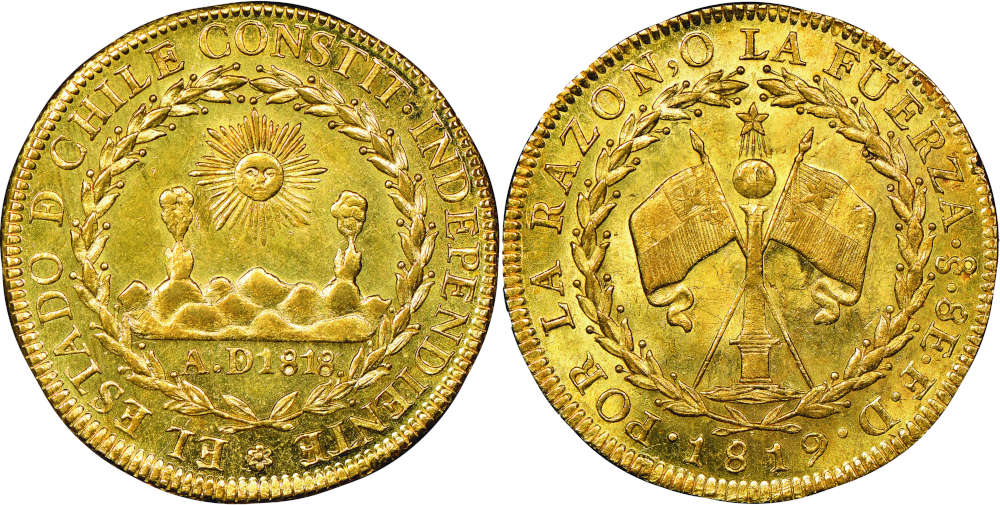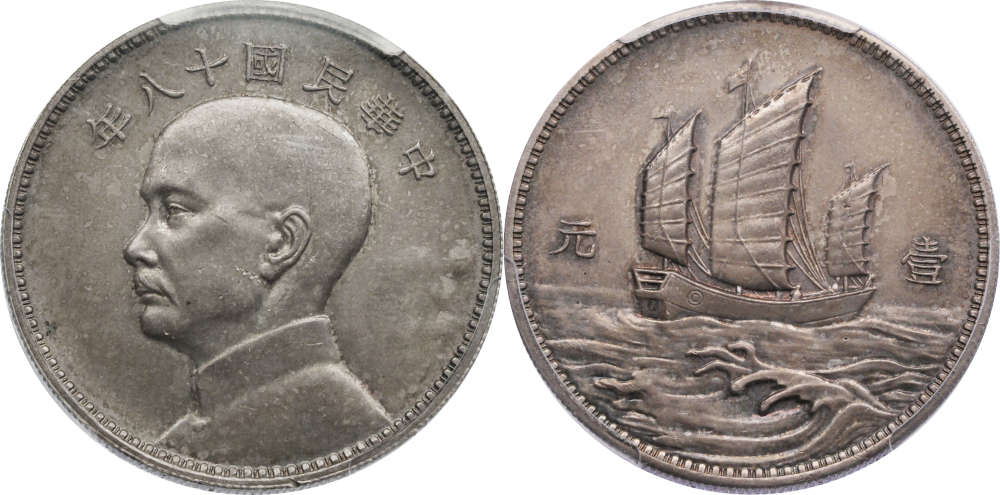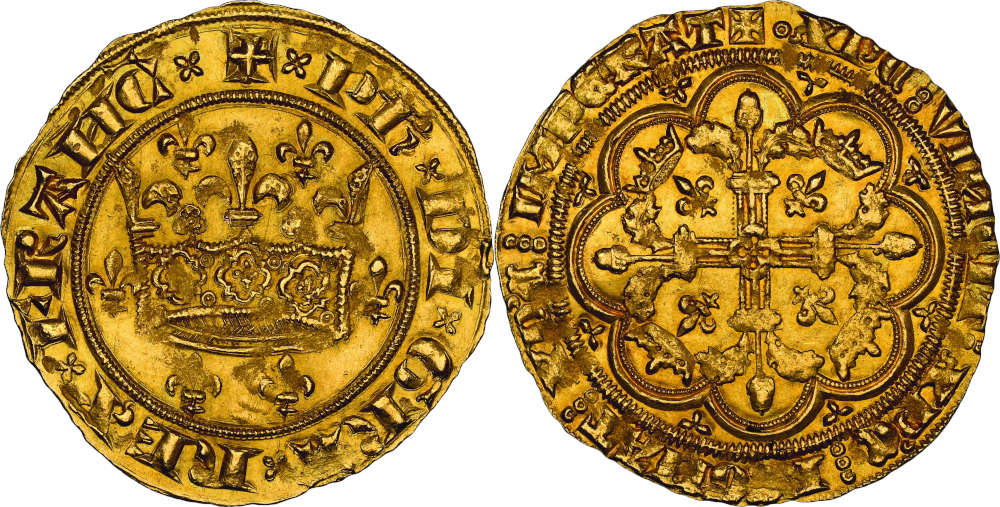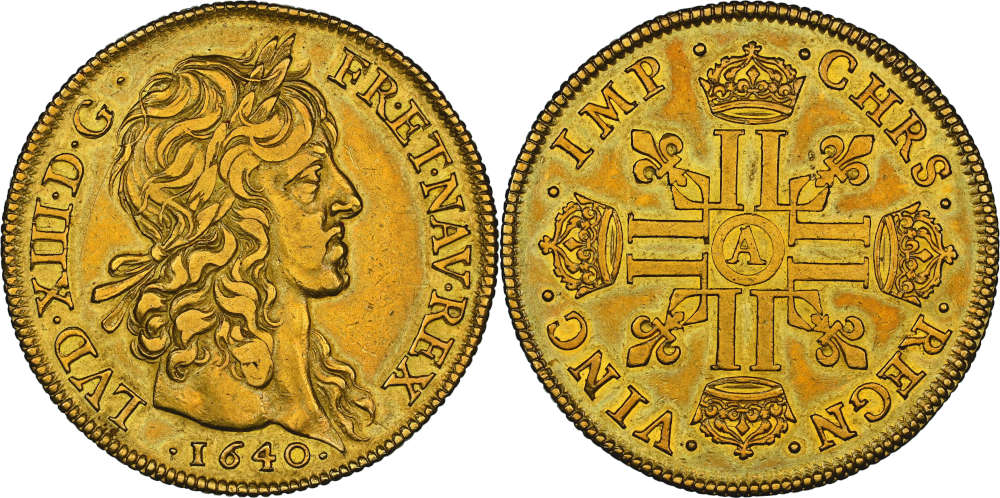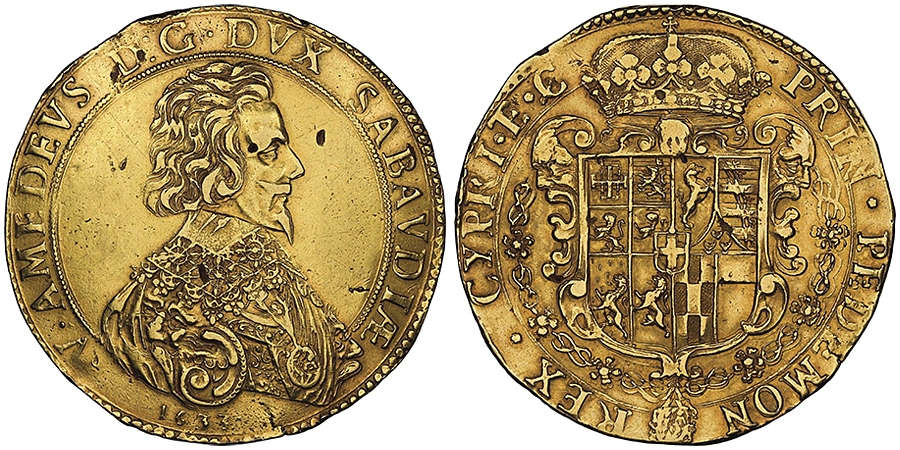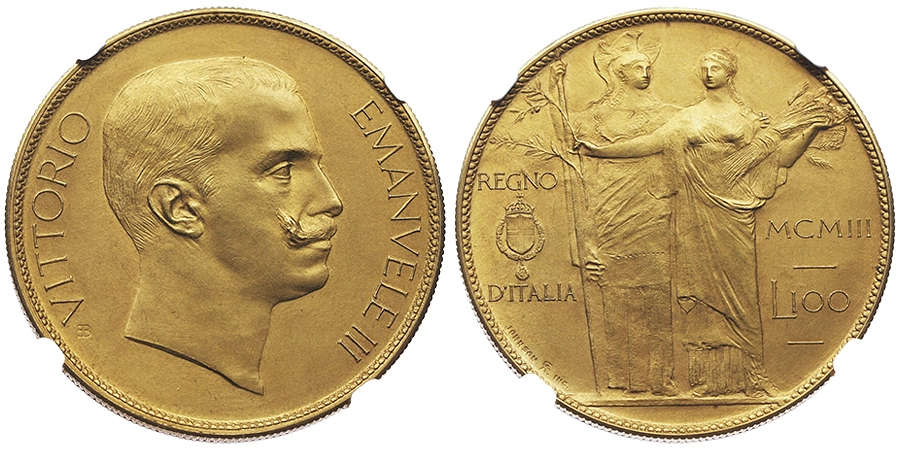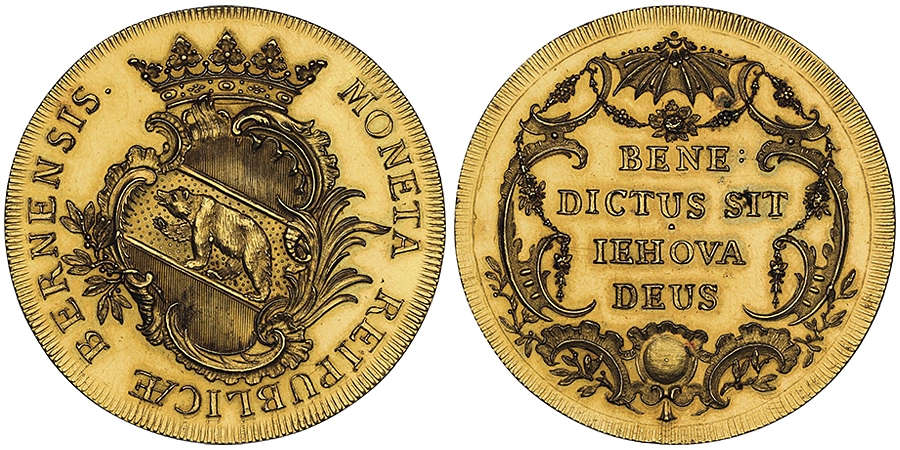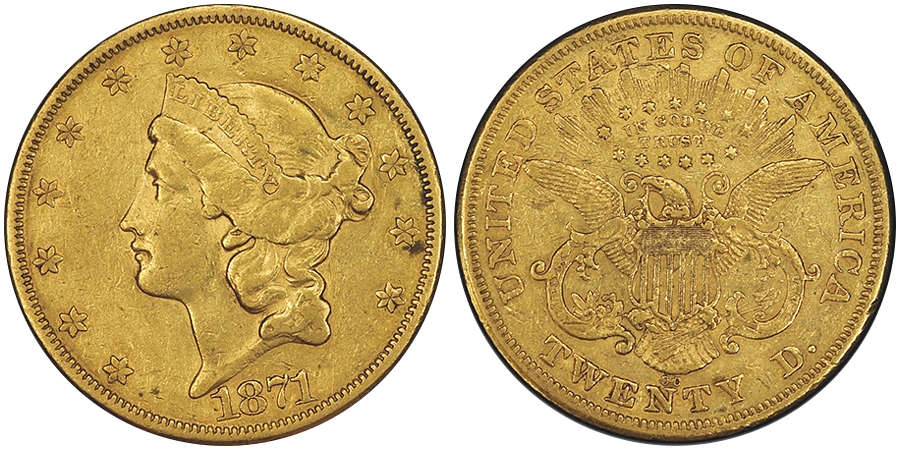Great Rarities from All Over the World at Gadoury
Éditions Victor Gadoury
Monaco 2023 Auction
Coins
14 October 2023
MC-Monaco
Once again, Francesco and Federico Pastrone invite coin enthusiasts to the elegant Hôtel Méridien Beach Plaza in Monaco. On 14 October 2023, they will hold their autumn auction sales. As usual, the auction house offers a wealth of high-calibre rarities in the five- and six-digit range. However, there is also an exciting offer of coins and medals in the mid-price segment, especially for collectors of gold issues.
Greek Coins
Collectors of Greek coinage should take a close look because this Gadoury auction starts with some masterful works of art by Greek engravers. If you prefer Archaic coinage, be prepared to be spoilt for choice. A tetradrachm of Leontinoi, the dies of which were created by the “Demareteion Master”? Or rather the iconic fight between lion and bull on a wonderful tetradrachm from Macedon Akanthos, created between 480 and 470. Those interested in the Classical period will be amazed by a tetradrachm from Rhodes, which shows Helios with untamed hair almost from the front. The excellent grade reveals the level of artistry that went into this coin design. NGC graded the piece AU*5/5 5/5 Fine Style.
Fans of outstanding provenances will be tempted by the gold stater from Lampsacus. It first entered the market in 1921, in a sale of the French Feuardent-Leman auction house.
An extremely fine and fully centered stater from Panticapaeum of the finest style is the Greek coin with the highest estimate in this sale.
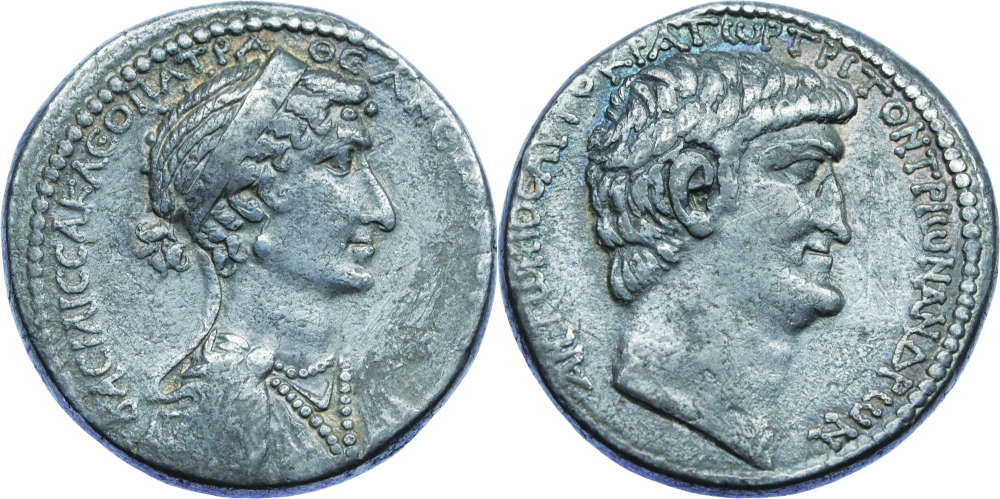
Lot 40: Cleopatra VII and Marcus Antonius. Tetradrachm, Antioch on the Orontes or unknown mint in Phoenicia, around 36 BC. From UBS auction 78 (2008), No. 1203. Rare. Estimate: 30,000 euros.
Roman Coins
If you are interested in the transition period between the Republic and the Empire, this Gadoury auction will provide you with a wealth of historically interesting denarii and aurei of excellent quality. They include an extremely fine denarius by L. Plaetorius Cestianus on behalf of Brutus Imperator. Even more remarkable is a tetradrachm, probably from Antioch on the Orontes, created around 36 BC. It shows outstanding portraits of Marcus Antonius and Queen Cleopatra.
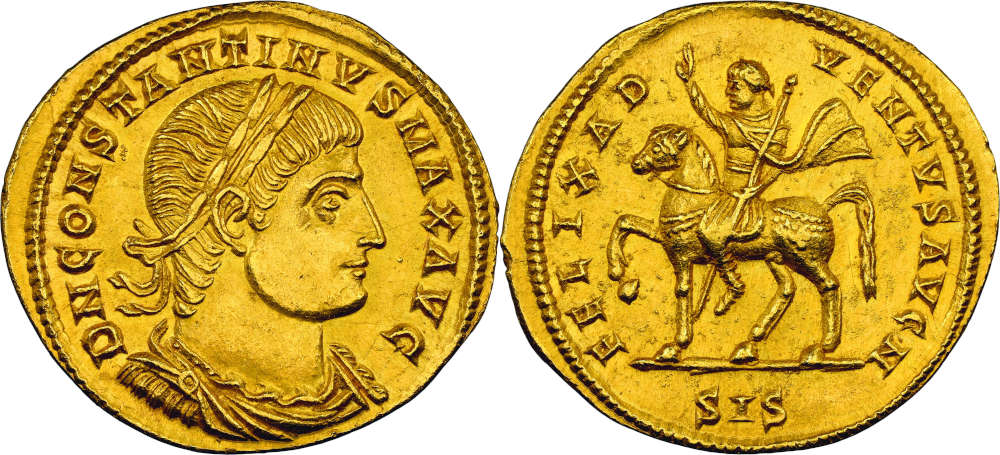
Lot 52: Constantine I 307-337. Multiple issue of 1 1/2 solidi, Siscia, 324-325. From Hirsch auction 24 (1909), No. 3634 (Consul E. Weber Coll.); from Schulman auction (1923), No. 641 (Vierordt Coll.); from Leu auction 72 (1998), No. 509 and from SINCONA auction 4 (2011), No. 4131. Extremely rare. NGC Choice AU* 5/5 4/5. Estimate: 100,000 euros.
The highlight among the about two dozen Roman coins are the issues of the late third and early fourth centuries. For example, an aureus of Constantius Chlorus minted in Trier in 305/6 is from the Hoard of Beaurains; a 1 1/2 solidus issue by Constantine, created in 324/5 in Siscia, is from the Consul E. Weber and Vierordt Collections.
There are also rarities from the Migration Period and the Eastern Roman Empire, for example a half hyperpyron of John V Palaeologus, the emperor who hoped to buy the help of the West against the Ottomans by converting to the Roman Catholic Church.
World Coins
From A like Allemagne to Y as in Yugoslavie – no matter what you collect, you should take a look at the Gadoury catalogue. It might contain the very rarity you have been looking for for decades. Take the example of Cambodia: Gadoury is able to offer a gold off-metal strike of a coin by Norodom I, which was probably distributed to ecclesiastic dignitaries on the occasion of the cremation of Queen Mother Meac Meneang in 1899. Only very few patterns were created for this coin.
Or are you interested in Chile? In that case, Gadoury’s autumn auction sale provides you with the opportunity to add an extremely rare 1819 eightfold gold escudo to your collection, which has previously been part of the Dr. Moore Collection.
There are eleven lots from China. The highlight is a 1929 pattern that was created in Birmingham. In that year, the Chinese Ministry of Finance decided to have new dies with new motifs created for the coins with the portrait of Dr Sun Yat-Sen. Mints in Italy, Great Britain, the United States, Austria and Japan were commissioned to hand in patterns. However, not a single one was met with the Ministry’s approval, and none of the designs were adopted. One of the rejected patters was this Birmingham issue with the depiction of a wonderful junk sailing ship.
If you are interested in modern Chinese coinage, you should also take a close look. Gadoury presents two extremely rare pieces, both of 5 ounces, one of them had a mintage figure of 1,900 and was created in 1993, the second one was created one year later with a mintage figure of 1,100 specimens.
A Major Series of French Coins
As always, Gadoury is able to offer an extensive series of French coins, a total of almost 200 lots. A first highlight is from 1340. Three years after the start of the Hundred Years’ War, Philip VI issued a particularly heavy gold coin – for the first and last time. While the reverse is in line with the design of the gold coins that were already circulating at the time, the obverse conveys an impressively clear message: the so-called “Crown of Charlemagne” – which actually was not created until later – points out that Philip VI, on whose head it rests, is the one whose claim to the French throne is legitimate.
We also know about the historical background of a second rarity of French numismatics that is on offer at Gadoury’s autumn sale. Jean Warin and Louis de la Croix, the engraver of the Monnaie de Paris, faced each other in a contest to find the most impressive design. In this context, Warin created multiple pieces of the louis d’or, and one of these pieces is the coin offered by Gadoury.
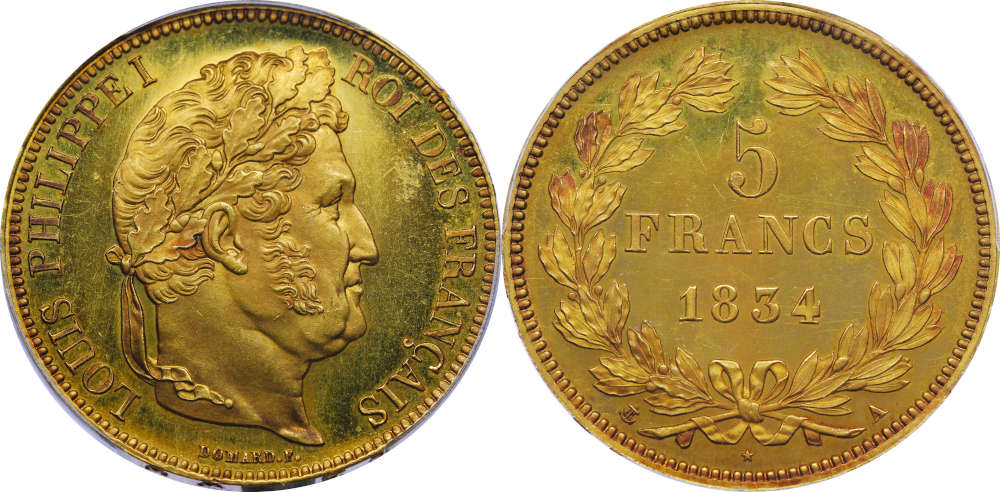
Lot 330: France. Louis-Philip I, 1830-1848. Proof gold pattern for the 5-franc silver piece, Paris 1834. Gadoury 678 (this specimen). From Sotheby auction (1954), King Farouk Collection, No. 547. PCGS SP66 (PROOF ULTRA CAMEO). Estimate: 200,000 euros.
The most expensive piece of the sale has a spectacular provenance: King Farouk of Egypt was the proud owner of this Proof pattern for the French 5-franc silver piece, created in 1834 by the Paris Mint. Is it even necessary to mention that this precious pattern is of the finest quality? PCGS graded it SP66 (PROOF ULTRA CAMEO).
Those who cannot or do not want to afford such an expensive piece can look forward to the small collection of French 20-franc gold pieces, assembled by an avid collector. The time frame ranges from Napoleon to the Franco-German War of 1871. Estimates start at 300 euros.
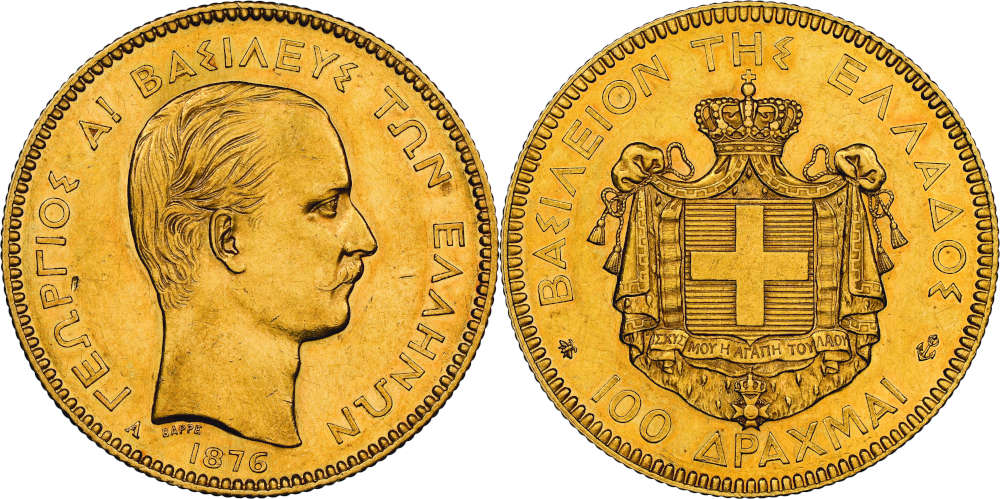
Lot 451: Greece. George I, 1863-1913. 100 drachms, Paris 1876. Only 76 specimens minted. NGC AU58. Estimate: 70,000 euros.
A Greek Rarity
Collectors of coins from the Latin Monetary Union know that, on the one hand, there are very common pieces that can be purchased at the price of their gold value and, on the other hand, that there are very rare pieces. One reason for this phenomenon is that the number of coins the individual countries produced differed greatly based on their population; secondly, countries could pay a dear price for minting coins of a certain metal at the wrong time due to the constant fluctuations of the gold and silver prices. Therefore, Greece produced as few as 76 specimens of its 100-drachm gold piece. Gadoury offers one of them. Those who do not want to participate given the estimate of 70,000 euros can try their hand at the silver 5-drachm piece. It has a moderate estimate of only 500 euros and was graded MS63 by NGC.
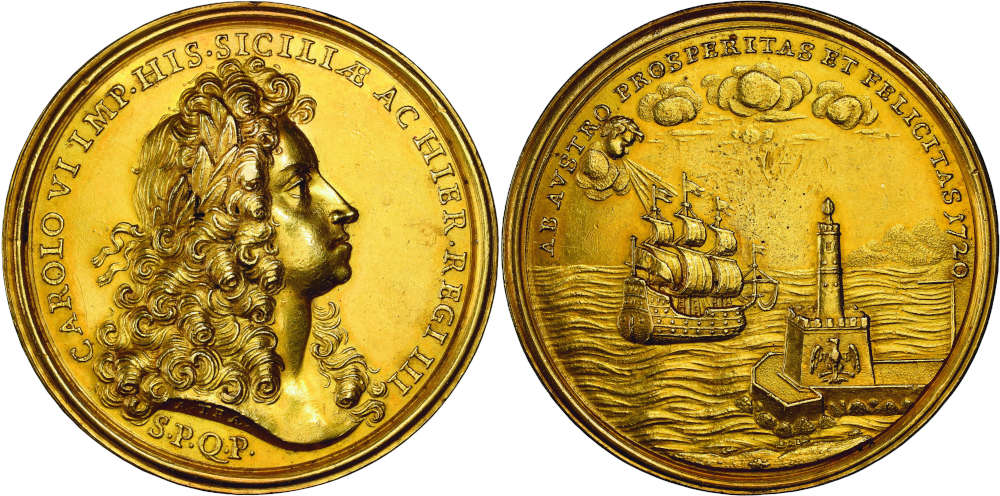
Lot 536: Italy / Kingdom of Sicily. Carlo VI, 1685-1740, King of Sicily, 1720-1734. Gold medal commemorating the Senate of Palermo paying homage to him when he took over the rule in 1720. Extremely rare. Minor perforation. About FDC. Estimate: 40,000 euros.
Extensive Ensemble of Italian Issues
Just like France, Italy is one of Gadoury’s specialties. And once again the auction house is in a position to offer an extensive series including almost 150 lots. We will present two pieces that represent the ensemble.
The first example is a medal that was minted on the occasion of the homage paid to Charles VI of Bourbon as King of Sicily and Jerusalem in 1720. Although Jerusalem had long been under Ottoman rule at this point, the monarch of Sicily still used this title. Emperor Frederick II had married the heiress to the Kingdom of Jerusalem in 1225. Since then, the titles of King of Sicily and King of Jerusalem had been tied to each other.
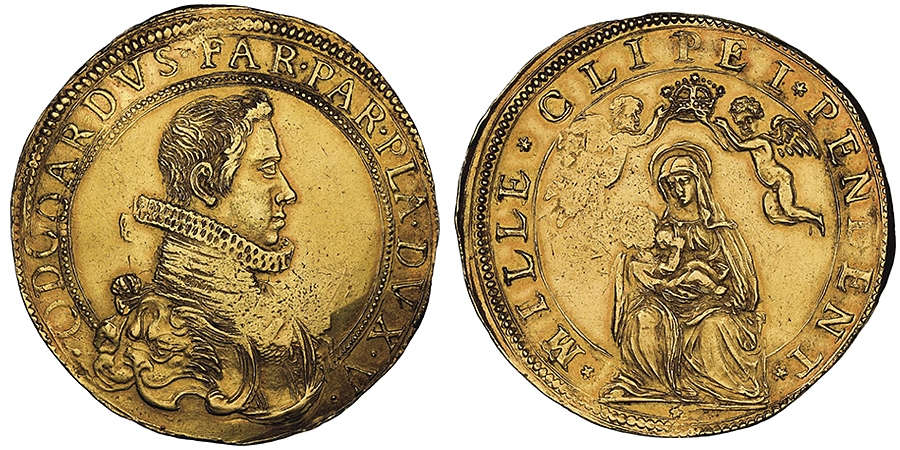
Lot 540: Italy / Parma. Odoardo Farnese, 1622-1646. 6 doppie, n.d. Extremely rare. NGC AU58. Estimate: 100,000 euros.
100,000 euros is the estimate of a sixfold doppie by Odoardo Farnese, Duke of Parma, which was minted between 1622 and 1646. Its reverse depicts the mother of God with a circumscription taken from the Song of Songs 4:4. The Song compares the neck of a beloved to a strong tower with thousand shields on it. This means that Odoardo begged for Mary’s protection to be bestowed on him – and he would have well needed that support: against the backdrop of the conflicts of the Thirty Years’ War, his attempts at expanding his sphere of power were unsuccessful.
Collezione Real Casa Savoia
In the autumn of 2023, another part of the Collezione Real Casa Savoia will be on sale. The undisputed highlight is the extremely rare 10-fold scudi d’oro of 1633. It is an unpublished variety! NGC graded it AU53.
Another extremely rare and coveted piece is a patter for the 100-lira piece featuring the portrait of Vittorio Emanuele III from 1903. The design was created by Stabilimento Johnson, a private institute for medal production in Milan.
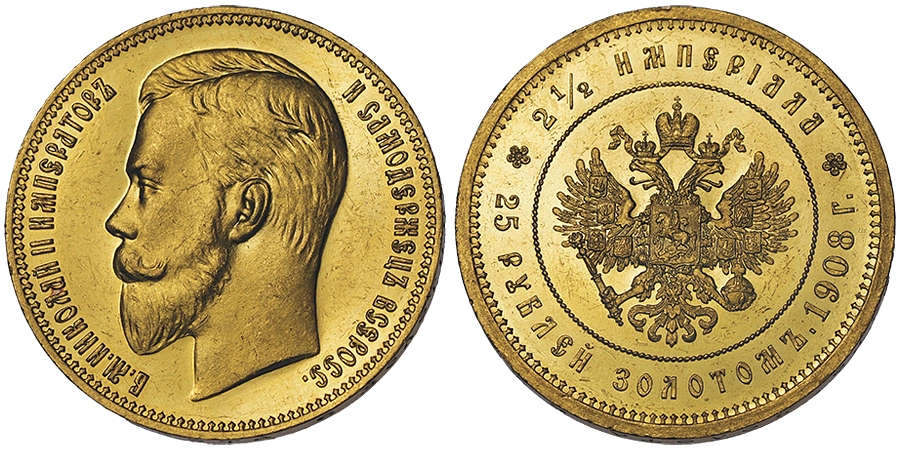
Lot 765: Russia. Nicholas II, 1894-1917. 25 roubles – 2 1/2 imperials, St. Petersburg, 1908. Only 175 specimens minted. Estimate: 40,000 euros.
Small Series of Russian Issues
25 roubles or 2 1/2 imperials, minted in 1908 in St. Petersburg: only 175 specimens were created of this issue. This is a good reason to assume that they were minted to be used as gifts on the occasion of the celebrations of the 40th birthday of Tsar Nicholas II. This piece is one of about two dozen lots with Russian coins and medals, including other rarities such as a gold medal for the Imperial Academy for Medicine and Surgery in St. Petersburg.
Tenfold Ducat from Bern
As mentioned above, even if there are sometimes only a few pieces on offer for a certain field, they often contain exciting issues and great rarities. One example for this is the section with Swiss coins, comprising three lots: a 1571 gulden taler from Basel, a 1857 shooting taler from Bern, graded MS62 by NGC and – the highlight – an extremely rare ten-fold ducat from Bern of extremely fine (MS61) quality.
USA
Once again, Gadoury is able to present a rich selection of US gold coins, including numerous rare years and mints. At this point we limit our list to:
- 20 dollars, New Orleans (1858). NGC AU55 (estimate: 10,000 euros)
- 20 dollars, Carson City (1871). PCGS XF45 (estimate: 30,000 euros)
- 20 dollars, Carson City (1873). PCGS AU55 (estimate: 10,000 euros)
- 20 dollars, Philadelphia (1927). NGC MS67* (estimate: 10,000 euros)







